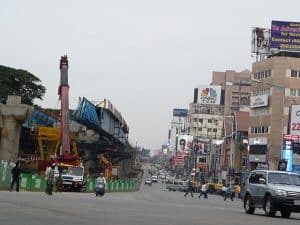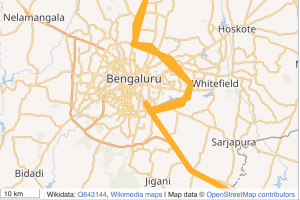There was once a time when two national highways ran through the heart of Bengaluru city. This is no longer the case since national highways have been renamed and restructured in recent years. Yet, recently, the nightlife hubs MG Road and Brigade Road were ordered to stop serving alcohol based on the Supreme Court order banning alcohol service in establishments just off national highways across India.

MG Road. Pic: WikiMedia Commons
The Supreme Court mandated the ban of alcohol service from establishments within 500 meters of state and national highways. The ban was put into action on July 1st , halting alcohol service from over 300 bars, pubs, restaurants and hotels in Bengaluru. On Tuesday, July 11th, the Supreme Court clarified that ban would not be applicable to highways running within city limits, giving a relief to bar and pub owners in the Central Business District area. The Court allowed to denotify those highways that pass through the city limits.
On July 1st, the Karnataka Excise Department had ordered over 130 establishments in the center of the city to stop serving liquor based on the information that MG Road connects to NH-4 and Brigade Road to NH-7.
Upon closer inspection and the well known fact that both MG Road and Brigade Road are nowhere near highways of any kind, Rahul Matthan a legal expert pointed out in an article in Mint, that the information that Karnataka Excise Department had based the ban of alcohol on these roads was based on outdated maps of two highways that no longer run their course through the city.
Currently NH-4 runs through Andaman and Nicobar connecting Mayabandar, Port Blair and Chiriyatapu, and NH-7 starts at the India-Pakistan border connecting Punjab, Haryana, Chandigarh, Himachal Pradesh and Uttarakhand, neither running through Bengaluru. In the past, however both highways ran through the city but were restructured and renamed seven years ago.
The Ministry of Road Transport and Highways had issued a Gazette Notification S.O 542(E) on March 5th, 2010, with the systematic renumbering of national highways. The ban in Bengaluru was based on the old routes of NH-4 and NH-7, which was once a national Highway.
In the state government’s record books, MG Road and Old Madras Road are reportedly national highways, which is affecting liquor licence holders; the books apparently show the road starting from Basaveswara Circle, passing through Raj Bhavan and MG Road until Trinity Circle, before reaching Old Madras Road, as a national highway.
So what about Outer Ring Road?
Even if the Excise Department had to ban alcohol on highways running through the city, the two highways relevant in this case are NH-44 and NH-48. Both run through Bengaluru.
Liquor never ceased to flow on Outer Ring Road connected to NH-44 within city limits, even as the order on pubs and bars in CBD was in force. According to Assistant Engineer, National Highway Authority of India (NHAI), Ramadevi, Outer Ring Road is not considered the same as NH-44 and is under the jurisdiction of the Bangalore Development Authority. The road was acquired and developed by the Bruhat Bengaluru Mahanagara Palike (BBMP) to divert traffic from the highway to the city center. There are however points that connect Outer Ring Road to NH-44 on the east side of the city. Ramadevi does not know if establishments on Outer Ring Road will be served with the alcohol ban.
When looking at Google Maps, Outer Ring Road looks to be the section of NH-44 that runs through city limits. What protects the businesses there from the ban according to Ramadevi is the Outer Ring Road is under the jurisdiction of the city and is not subject to the alcohol ban that only applies to national highways outside city limits. This should protect MG Road and Brigade Road as well.
I called 12 restaurants, pubs and bars on located on the east side of Outer Ring Road that connects to NH-44. I asked if they knew how close their establishments were located to NH-44 and if they have been asked to renew their liquor license within the last month. I was either hung up on, told NH-44 is nowhere near Outer Ring Road or told to call back at a later time.
What’s happening on MG road?

Map of current NH-44 route. Pic: OpenStreetMap contributors
For establishments that rely on liquor sales to make a profit saw a significant drop in sales. Especially for restaurants on MG Road that had no prior knowledge they would be affected by the ban until it was too late.
Krishna Shantakumar, general manager of Aswathi Inns on MG Road said they’ve experienced a 70 percent decrease in sales since the ban went into action on July 1. Shantakumar along with other business owners and managers in the area have long been questioning why the ban applies to them with no national highway in sight.
“When this case came up in November and December we went to the highway department and clarified with them and they laughed and said we are not on the highway,” Shantakumar said. “The state government knew we would be affected and gave no warning.”
Shantakumar said he was asked to renew his liquor license in June without any warning that the ban would cease liquor sales at his hotel in the next month. The application was declined, the money never refunded and liquor service was shut down on MG Road. According to Shantakumar in June when business owners asked the Karnataka Government why their licenses could not be renewed they were told MG Road was connected to NH-4.
The recent clarification by the Supreme Court to eliminate the ban within city limits should allow establishments on MG Road and Brigade Road to regain their liquor licenses. The only thing left to do is wait to be denotified by the state government.
Refusing to consider MG Road as a highway, Shantakumar said: “It cannot be a highway. The nature of the roads defy what a national highway should be. Explain to us how you call this a highway – that is what we are asking.”